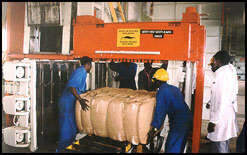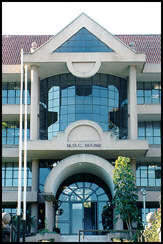
|

 Introduction - Economy - Investment - Modernization & privatization - Regional integration Introduction - Economy - Investment - Modernization & privatization - Regional integration
Big Leagues - Infrastructure - Transport - Agriculture - Tourism
Tourism, the future - Tourism, new era - Warm heart 
 INVESTMENT INVESTMENT |
 GOVERNMENT POLICIES GOVERNMENT POLICIES |

The Malawi government has put in place investment policies aimed at encouraging private sector participation in the economy. While these investment policies have been enacted in earnest their implementation has lagged behind thus making them less effective at addressing the relevant issues. Government recognises that this is a major issue of concern to the private sector and is thus committed to reverse the situation by ensuring that policy implementation is given top priority. In this regard, the government recently established the Task Force on the economy whose mandate is to ensure that government policies are implemented and to review any policy implementation problems that may rise. The Task Force comprises Cabinet Ministers and private sector operators with the Ministry of Commerce and Industry as its Secretariat.
As entrepreneurship and human resource development are critical in determining competitiveness, the government will continue to place strong emphasis on developing entrepreneurship to ensure the existence of a critical mass of entrepreneurs ready to take risks. This will be done by providing support to institutions as well as programmes aimed at entrepreneurship development. In addition, the government will provide support to the development of human resources for industry in view of the fact that skilled labour is a prerequisite for entry into the global market.
Government believes that successful private sector development requires the existence of institutions that are efficient and effective in promoting private sector performance. In this regard, support to institutions like Malawi Export Promotion Council, Malawi Industrial Research and technology Development Centre, Malawi Bureau of Standards, the Small Enterprise Development Organisation of Malawi, the Malawian Entrepreneurs Development Institute and the Development of Malawian Enterprises Trust will enable them play a catalytic role in Malawi’s private sector development efforts. These institutions will also have to be reoriented to meet the challenges of globalisation.
In addition to strengthening such institutions, the Malawi government recognises the need for effective public-private sector dialogue as a means of establishing effective and institutionalised communication between the public and private sector. In this regard, several mechanisms have been put in place to enhance this collaborative process. The Business Council, the Business Forum, The National Economic Council and the Task Force on the Economy are all structures created to achieve this objective. In addition, the Cabinet Committee on Manufacturing and the Cabinet Committee on the Economy also interact with the relevant sections of the private sector as and when necessary.
It is further recognised that to spur competitive production in Malawi there is need to continuously put in place an enabling environment for private sector participation. That is the reason why the government has and continues to endeavour to put in place incentives. During 1999/2000 budget, government outlined more incentives to encourage production. One such incentive was the duty free importation of raw materials for those that are in manufacturing. Government has also drafted new incentives which will be presented to the National Assembly soon.

Moreover, the government recognises that SME play an important role in the Economy and that as such as the sector needs to be supported. In this regard, it is committed to ensuring that the sector is provided with adequate support with regard to policies and programmes that would enable the sector to grow. To this extent, an SME Strategy has been prepared outlining government’s intentions on the future direction of the sector. The strategy prepared under the UNDP supported Enterprise Development and Employment Creation Programme (EDEP), cover issues such as the policy environment, access to credit, access to markets, access to technology, business management,…
Although government recognises that in the process of development some sectors of society could be hurt by monopoly powers exercised by some enterprises. Consequently, the government remains committed to implementing the competition policy and the Competition Act with a view to curbing monopolistic tendencies which would be detrimental to private sector operations.
 General incentives General incentives |
Malawi has a competitive corporate tax rate of 38% and low import duties. In addition, Malawi offers an array of incentives, which often give new businesses an effective tax holiday for the first several years of operation. These include:
40% investment allowance on qualifying expenditures for new buildings and machinery
Up to 20% investment allowance on qualifying expenditures for used buildings and machinery
Allowance for manufacturing companies to deduct all operating expenses incurred up to 24 months prior to the start of operation
| Agreements for Reduction of Withholding taxes on remittances and payments
Duty free importation of heavy goods vehicles with capacity of at least 10 tonnes
No withholding tax on dividends
An additional 50% allowance on qualifying training costs
Indefinate loss carry forward to enable companies to take full advantage of their tax allowance
Duty free importation of raw materials in the manufacturing industry
New investments between US$5.0 million and US$10.0 million are given an option of paying 15% corporate tax indefinitely, or 5 year tax holiday while those in excess of US$10.0 million are given an option of paying 15% corporate tax indefinitely, or 10 years tax holiday (where a foreign investor involved, the foreign capital contribution should not be less than 30%).

 Incentives specific to Export industries Incentives specific to Export industries |
Incentives for industries manufacturing in bond
An allowance of 12% of export revenues for non-traditional exports (i.e exports other than tobacco, tea, sugar, and coffee)
A transport allowance of 25% of all international transport costs and firms manufacturing under bond
No duties on imports of capital equipment for the manufacture of exports for firms manufacturing under bond
No duties and surtaxes on raw materials
No excise tax on locally produced raw materials as well as packaging materials
Incentives for industries in Export Processing Zones
Zero percent corporate tax rate
No withholding tax on dividends
No duty on raw material and capital equipment
A transport allowance of 25% of international transport costs
No excise taxes on locally produced raw materials as well as packaging materials
No surtaxes (value added tax)
Recognising the need for the diversification of exports and a more focussed approach to private sector development, the government with assistance from the World bank has embarked on the preparation of a Private Sector Development Strategy. The strategy will focus on the competitive advantage available to various existing, emerging and potential industries in Malawi. This would involve a sector by sector analysis of the competitive advantage with a view to determining the predominant strategy available to each industry taking into account potential domestic and international demand for the products and services. There are still other issues that need to be analysed, including:
The trade regime under which the products would be exported
Developments within the industry, especially with regard to technological changes and changes in the productivity of Malawi’s competitors;
And the current and future changes in the structure of industry in Malawi as well as the effect of the above business constraints on product quality and costs.

In addition to the strategy, an Action Plan for the removal of business constraints will also be developed. Although government is aware of most of these constraints as outlined above, the specific impact of these constraints on the cost structure of industries needs to be quantified. In order to spearhead the process government established an Advisory Group for the project comprising of members of government such as the secretary for commerce and industry, Malawi Development Corporation, Commercial Bank of Malawi… |
 JOINT VENTURE OPPORTUNITIES JOINT VENTURE OPPORTUNITIES |
| COMPANY | PROJECT | SECTOR | COMMENTS |
Malawi Development Corporation (MDC) | Graphite mining | Mining | Technical and marketing partner required. Further work to increase reserves required. |
Production of resin and turpentine |
Manufacturing
| Collection of rosin from forestry operations and set up a distillation plant at Chikangawa forestry in Northern region of the country. A technical partner is sought to provide technical services and possibility management services. |
Prophate Fertilizer | Project as feasibility study level. Joint venture partnership required. | | Paper recycling | A joint venture partner is sought for the project. A feasibility study was conducted to assess the viability of the project. | | Press Corporation |
Soft Drinks Bottling |
Manufacturing | Looking for additional financier. A franchise licence to manufacture Pepsi Cola has already been negotiated from Pepsi Cola Bottler Investment Limited (PCBI). |
Malawi Development Corporation (MDC) |
Hotel resort | Tourism | Looking for joint venture partners to develop a 150 bedroom 5 star hotel at Cape Maclear i.e Southern end of Lake Malawi and lodge at Likoma Island. |
City Centre Hotel |
Tourism | Looking for interested partners to establish a 5 star 150 bedroom hotel in the city of Blantyre. |
Energy and Minerals Development Company | Clay products Factory | Construction | A new project in investigation stage. Looking for joint venture possibility. |
Press Corporation | Bauxite Mining and Alumina refining |
Mining |
Press Corporation is looking for joint venture partner for these projects | | Coal Mining, processing and distribution | | | Clothing, manufacturing for export | Manufacturing | Press Corporation is looking for investors to complete this project | | | Bed linen and soft furnishings for export | Manufacturing | Press Corporation is looking for investors to complete this project |
Tayamba General Dealers Limited | Casino | Tourism | Looking fir a technical partner to establish a casino along the beaches of Lake Malawi. Land is available. |
National Sugar Corporation Limited | Sugar production | Manufacturing
(Food processing)
| Looking for joint venture/technical partners to go into production of sugar |
Press Corporation |
Developments of hotels, Lodges and Safari Lodges |
Tourism | Press Corporation is willing to develop hotels on the shores of Lake Malawi, Lodges on the plateaus and Safari Lodges in the game parks. For this project, Pres Corporation is looking for partners. |
MDC & Press Corporation | Aquaculture | Fish Farming | Looking for joint venture partnership on commercial fish farming for both local and foreign market |
Zipatso Association | Production of fruit juice concentrate | Manufacturing
(agro-processing) | Project is based in Mwanza where most of the oranges are grown in Malawi. The project requires technical assistance for a feasibility study and eventually, equity participation and loan finance. Currently fruits are consumed raw. |
Leopard Matches Company | Production of matches | Manufacturing | The Government owns 30% shares in the company and would like to dispose the entire holding to the private sector |
MPICO Holdings Ltd | | Property development | The Government directly owns 25% shares in the company and now wants to divest its interest in the company. |
Malawi Catering Services | Catering services | Manufacturing (Food) | The company provide catering services to air crafts at the Lilongwe International Airport. The Government wishes to evaluate the possibility of private sector participation in the company. |
The New Building Society | Finance services | Financing | The Government owns 51% shares in the company and wants to divest part or all of its shares. |
|
|
© World INvestment NEws, 2000.
This is the electronic edition of the special country report on Malawi published in Forbes Global Magazine
October 30th 2000 Issue.
Developed by AgenciaE.Tv |
|
| | | | |
| |
|

